This is a little story about how one moment crystallised being afraid and how that helps me create believable tension in stories.
It wasn't the first time I'd been afraid of the dark and of unseen noises--as a teenager I'd walked home often enough in the dark after watching horror movies with my friends to have tapped into those fears--but there is one moment in my very early twenties that crystallised this and which I draw on often when putting my characters in jeopardy.
The first time I was afraid for my life was in Venice...
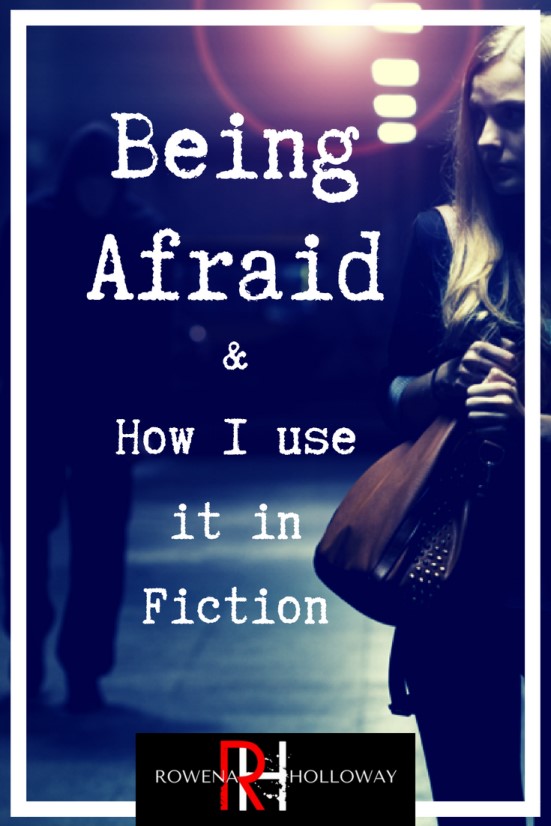
Being Afraid in the Alleys of Venice.
My husband and I were newly engaged and doing our grand tour of Europe when we stepped off the train late one evening in Venice. Exhausted, we stood on the brightly lit platform trying to get our bearings. Could we afford a taxi? Did they even have taxis in Venice? How much money did we have? This was back in the days of Lire and the copious zeros on every note left us bewildered.
A quick consult of Frommers assured us our accommodation was walking distance from the station, so armed with a map and weighed down by overflowing suitcases (yes, suitcases!) we stepped out into the night. The humid evening was coloured with laughter and mandolin music. From somewhere across the canal came the throb of dance music.
We hadn't eaten since Paris
The scent of pizza and other delicacies tempted me toward a collection of outside tables with glowing candles on each and an air of intimate romance that seemed impossible in such a crowded spot. We hadn’t eaten since Paris.
‘No time,’ my beloved muttered, striding toward the bridge that led in the direction of our hotel.
I slunk after him, farewelling my fantasy of a romantic supper, but looking forward to a comfortable bed for the first time in days.
Two clueless outsiders
Gazes followed as we passed. Sometimes I was certain the laughter was aimed at us, two clueless, travel-weary outsiders. No doubt, if they noticed us at all, they were laughing at us lugging two ridiculous suitcases through those crowded streets, but my beloved was certain they eyed-off his moneybelt though it was well-hidden beneath his t-shirt.
As we moved away from the bridge and the reveler-filled palazzo, the crush began to thin. The streets grew darker, narrower. The tall buildings loomed over us.
Murmurs in the shadows
The alleyways swallowed light, murmurs mingled in the shadows and from one dark lane came angry grunts and scuffles. I kept my head down and moved with purpose. Our footfalls echoed off the walls keeping time with my galloping heart rate as I waited for every lithe body stepping from the shadows to wield a knife, to see the flash of steel in the moonlight.
Why was I so afraid? This was a once-in-a-lifetime journey. I’d walked through scarier places. And horror didn’t usually come wrapped in mandolin music.
Primed for fear
It took me years to figure it out. Primed by fatigue, my partner’s anxiety and being in a strange land, I had dredged up images from some half-remembered 70s movie, one where Donald Sutherland gets attacked with a knife in the alleys of—you guessed it—Venice.
That was the first time I recognised how much we filter place through our perception. A character (and reader) who is primed to fear an environment will generate much more tension than one who is comfortable. Subtle things like shadows, noises and even the mythology surrounding place heighten unease. That insight, at a time when I’d never considered writing as a career, has been invaluable.
How our fear benefits us as a reader and a writer
When we're caught up in the story, really pulled in, we are with that character all the way. We want them to win or, in the case of the baddie, maybe we want them to lose. When we're fully captured we are that character. We are surprised, shocked, we grip the book tighter, our breath gets short, the rest of the world vanishes.
For readers it's about relatability
We can relate because though we may never have run through the woods pursued by people who want us dead, we may have been chased through the school yard, we may have found ourselves lost in unfamiliar places, we may have heard shouts and footsteps coming up behind us on a dark street
No matter what our experience we can relate to a character who is in fear of their life.
Hands up if you've ever had had the naked-in-public or the I-forgot-to-prepare-for-the-exam nightmare.You know exactly how that feels, right? Nightmares tap into remembered or imagined fears and seem as real as if they are happening right then.
And as readers it's all the more exciting because we can experience that fear knowing we are safe.
For writers it's about believability
When writing fiction it's not so much about being real, it's about being believable. The difference is something most (probably all) novice writers struggle to understand. A novel is not real life. As Alfred Hitchcock said,
What is drama but life with the dull bits cut out?
Alfred Hitchcock
When I first quit work to write, I tapped into my anger about what had happened. Over the years I worked on that first novel, most of that hit the cutting room floor. Why? It was real. Those feelings were valid. And I'd given my character a similar trauma to work through. So it was relevant to her character and to the choices she made. But it wasn't interesting to read. I realised (eventually!) that a little goes a long way. Just enough for my readers to tap into those feelings in themselves.
Writers who tap into their fears make their characters' fears more believable.
How I use being afraid in suspense fiction
I've discovered there are many ways to use my own experience to bring to life scenes in which my character's face jeopardy. Below are examples of three different situations that all draw on moments in my own life when I've been afraid: the threat of immediate danger; the expectation of danger through visual cues; the memory of a traumatic event.
All can be powerful, but for the reader to really feel what the character feels the writer would have spent some time building up to these moments. Still, I hope these excerpts illustrate my point.
Immediate danger in Bad Things Happen
As the title suggests, in novel Bad Things Happen, there are several scenes in which I had to tap into my fears. When Charlotte is hot on the trail of the truth about Joey Baptiste she goes deep into Epping Forrest in the dead of night alone looking for proof.
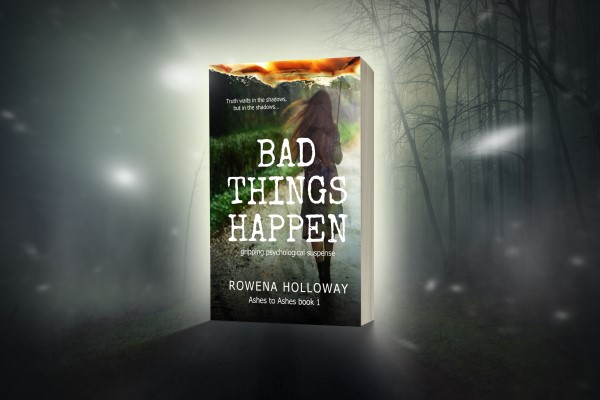
A shout close behind sent her skidding away to the right. Branches whipped at her face and jabbed at her legs as she dashed into the darkness. Her foot caught something solid. She hurtled forward, her hands outstretched, and landed hard on her stomach. Winded, she struggled to breathe, gulping at the fetid air. Bark beneath her hands. The stink of rotting vegetation. A log. She’d hit a fallen tree. Where was her phone? She patted her zipped pocket. Still safe. While she had it, she had insurance.
Voices called out, jeering, teasing. In the echoing night she couldn’t get a bead on the direction. It felt like they were all around.
Desperate to quiet her ragged gasps, she gulped air and pulled herself forward until she slid to the other side of the fallen trunk, and kept sliding, down, down. Faster and faster. Her hands grabbing at passing branches, leaves, clumps of anything she could find. A tangle of branches stopped her descent. A shrub. The branches flexible and thin. Her ankle throbbed. Every muscle burned. Once more she tried to get her breathing back under control.
A slant of moonlight lit the gouges she’d made in the earth. A spit of rain hit her nose, her forehead. She looked up. Clouds rolled across the crescent moon and the sliver of moonlight disappeared. But she’d seen enough. Her tumble over the fallen tree trunk had sent her down a river embankment. The babble of water sounded somewhere not too far below.
Voices. Torchlight danced above as they gathered together. Once their torches lit the rotting tree trunk, they’d see the trail she’d left in the soft earth. Charlotte held her breath and for the first time in her life prayed for a miracle.
The expectation of danger in All That's Left Unsaid
In All That’s Left Unsaid, my main character Harriet is in Italy to uncover the truth about her mother’s past. Emotionally she’s a mess. She’s in a foreign land, she doesn’t speak the language and everything seems opaque and sinister. As you can see I directly drew on my experience in Venice!
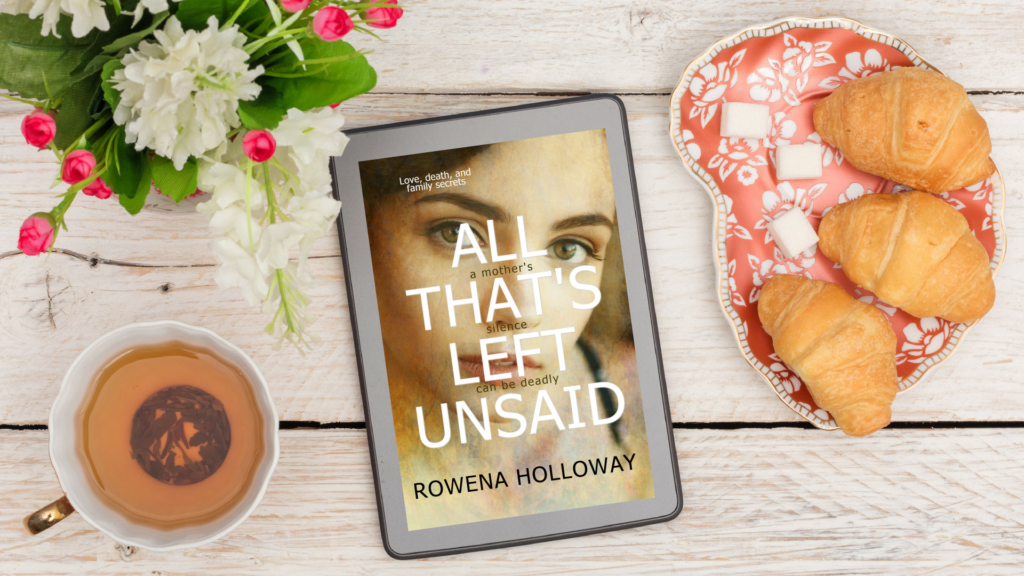
Ahead, looms the tumbledown building. Bats silhouetted against the almost-full moon wouldn’t look out of place, and the prospect of remaining in the dark street, vulnerable and alone, has more appeal than entering that eerie pile.
A weak light flickers through the slats of a shuttered upstairs window. Moonlight bathes the unkempt bushes and casts deep shadows around the building. The ground floor is so overgrown with creeping vine that I can’t find a door but dare not use the torch I’d found in the Fiat’s glove box. A skeletal staircase leads to the second floor. At the top is a dark void that must be an entrance. Wind whistles through stone crevices, rustling leaves as it whirls past. I place my foot on the first weathered step. Time has softened the silvered timber, but the treads are still firm.
Okay, time to find some courage.
I close my eyes, take a deep breath and release it slowly as I ascend.
Within its pitted walls, the house is no less creepy. The lamenting wind finds every crack. Every crevice seems pierced by moonlight. Tentative, I step inside, get the lay of the place: central corridor, a room either side with a larger one at the end where a pile of fallen struts and tiles is lit by the moon; rotted floorboards, including a jagged hole big enough for a person to fall through near the large room; to my left, a stone staircase descends to the murky ground floor.
The whole place is haunted by weirdly shifting shadows.
Remembered trauma in Pieces of a Lie
In Pieces of a Lie, set in Australia, the male protagonist, Linc, is on familiar ground. He’s on a midnight stakeout, something he’s done a hundred times before, but a difficult case has left him doubting his talents as a detective, and after a sexy interlude with the heroine he’s unsure of his ability to remain objective.
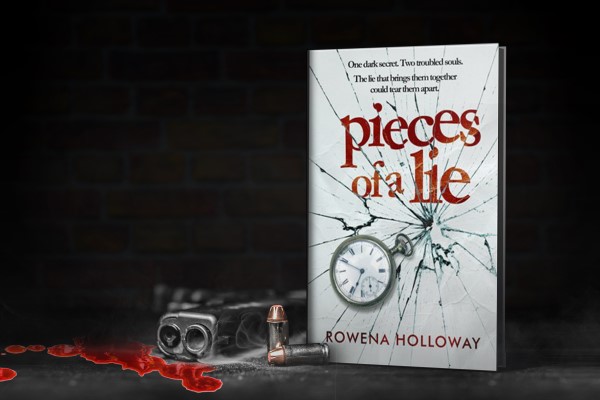
The heft of the police issue Smith and Wesson felt alien, awkward. Perhaps it was the dimensions, different from the Glock he was used to, or maybe it was because of the memories conjured by the cold metal.
The shooting. It always came back to that.
‘There’s been an accident in the Sydney Harbour Tunnel,’ Jodie had told him as they hid beside their vehicle waiting for the SWAT team. ‘Negotiator won’t be here for another twenty minutes.’ Linc had peeked over the hood. The assailant, in a grimy singlet, limp jeans and bed hair, had a sawn-off shotgun in his right hand and the fingers of his left bunched in the white-blond hair of the boy. High on some concoction he’d cooked up in his kitchen, he shouted incoherent abuse, so wild-eyed it was obvious he was beyond reason. He’d pressed the gun to his son’s head and told them to stay away or by fuck he’d blow them all to Hell. The kid whimpered, his bottom lip quivering as he sucked down his tears. He was reportedly nearly five, but his wide blue eyes and plump face made him look like a toddler.
The negotiator’s E.T.A. was still more than ten minutes. The kid could’ve been dead in a second. Linc had made a decision that changed at least three lives. That blameless kid would never be innocent again.
Linc’s insides quivered, sweat peppered his hairline. If he didn’t get a grip, the shakes would start and he’d be lost. He had to keep it together. He had a job to do, and no amount of penance could undo that moment. He gripped the steering wheel and focused on the gleaming puddles of water from an earlier burst of rain, concentrated on the dimpled steering wheel and the rough stitching beneath his fingers. Being present, noting every little detail at that moment, was a strategy his shrink had encouraged. Except for that advice, soft-bellied Brian with his blinkered life and cosy theories didn’t have a clue.
Strangers in a strange land is something I’m drawn to write. Sometimes that land is foreign shores, sometimes that strangeness comes from a slightly off-kilter psychological landscape that renders the familiar mysterious. Sometimes it is both.
As irrational as my fear may have been on that humid night in Venice I mine those feelings when my characters confront their worst fears on the way to their happy ever after (or the possibility of it 😉 ).


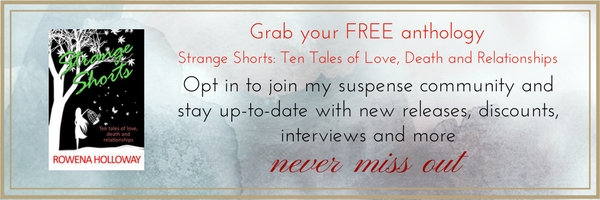
We’d left the hotel by taxi heading for a launderette (it’s amazing how you can amass dirty clothes while travelling). Dry, clean clothes at last, we had to retrace our way back (as there wasn’t a taxi to be had)…difficult when you’re a foreigner, don’t speak the language, unfamiliar with the area and under time restraints (a train for another country). We were lost. Fear and anxiety were bearing down on me as the thought of missing our train would throw off all our travel plans (couchette reservations are hard to come by) . Luckily, I had the hotel key fob, but a chill ran up my spine when I realized it just had its name, not the address on it. Somehow we found our way to the muni tram station where a kind old station attendant took the time to look up the address in a phone book (after watching me go through a charade of wild hand movements). Needless to say, we made it back to the hotel, repacked our luggage with clean clothes and got to the train station with minutes to spare. The luxury of looking back over a scary incident is one thing, living it is another.
Oh my gosh JT that is some story! We’ve spent the night on a lonely dock waiting for a ferry that never came, got lost in Munich (blame that on the Hobfrauhaus and three litres of beer) and missed a train because the taxi driver took the loooong way around. But we never faced a situation like yours. As you say, great stories to dine out on, but not such fun at the time. Glad you got your train.